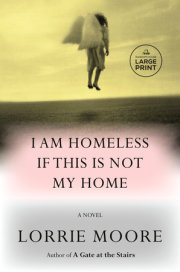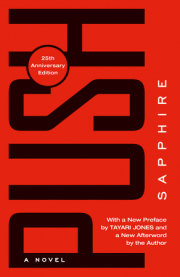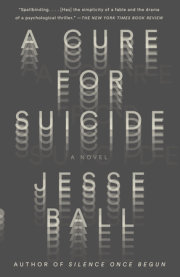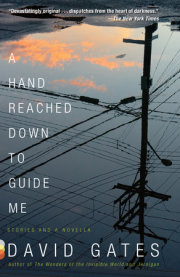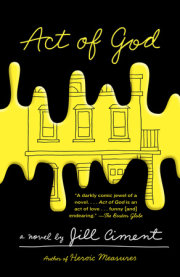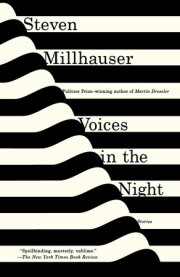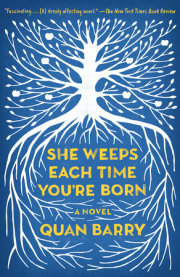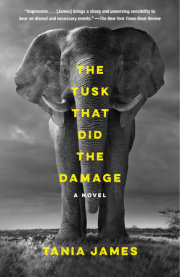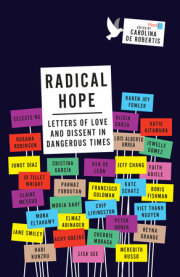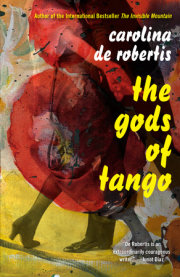Excerpted from the Hardcover Edition1.
Arrival Some things are impossible for the mind to hold alone. So listen, if you can, with your whole being. The story pushes and demands to be told, here, now, with you so close and the past even closer, breathing at the napes of our necks.
He arrived on the second of March, 2001, a few minutes after midnight. I was alone. I heard a low sound from the living room, a kind of scrape, like fingernails on unyielding floor—then silence. At first I couldn’t move; I wondered whether I had left a window open, but no, I had not. I picked up the knife from the counter, still flecked with squash, and walked slowly down the hall toward the living room with the knife leading the way, thinking that if it came to fighting I’d be ready, I’d stab down to the hilt. I turned the corner and there he lay, curled up on his side, drenching the rug.
He was naked. Seaweed stuck to his wet skin, which was the color of ashes. He smelled like fish and copper and rotting apples. Nothing had moved: the sliding glass door to the backyard was closed and intact, the curtains were unruffled, and there was no damp trail where he might have walked or crawled. I could not feel my limbs, I was all wire and heat, the room crackled with danger.
“Get out,” I said.
He didn’t move.
“Get the hell out,” I said, louder this time.
He lifted his head with tremendous effort and opened his eyes. They were wide eyes that seemed to have no bottom. They stared at me, the eyes of a baby, the eyes of a boa. In that moment something in my core came apart like a ship losing its mooring, anchor dismantled, the terror of dark waters on all sides, and I found that I could not turn away.
I raised the knife and pointed it at him.
The man shuddered and his head collapsed against the floor. My instinct was to rush to his side, help him up, offer him a hot drink or an ambulance. But was he pretending, hoping I’d come closer so he could overpower me? Don’t do it. Don’t go near him. I took a step backward and waited. The man had given up on lifting his head again, and was watching me from the corners of his eyes. A minute passed. He did not blink or lunge or look away.
Finally, I said, “What do you want?”
His jaws began to work, slowly, arduously. The mouth opened and water poured out, thick and brown like the water of the river, seeping into the rug. The murky smell in the room intensified. I took another step back and pressed against the wall. It felt cool and hard and I wished it would whisper Sshhh, don’t worry, some things are solid still, but it was only a wall and had nothing to say.
His lips worked around empty air. I waited and watched him strain to form a word. Finally he spoke, unintelligibly and too loudly, like a deaf person who has not learned to sculpt his sounds. “Co-iii-aahh.”
I shook my head.
He made the sound again, more slowly. “Coo. Iiiii. Aaaahh.”
I tried to piece it together. “Coya?” I asked, thinking, a name? a place I’ve never heard of?
“Coo. Miiiii. Aaah.”
I nodded blankly.
“Coo. Miiiii. Dah.”
And then I understood. “Co-mi-da. Food. Food?”
He nodded. Drops of water fell from his face, too copious to be sweat; they seeped from his pores, a human sponge just lifted from the river—though even sponges would stop dripping at some point, and this man’s wetness had not relented. Without turning my gaze away from him, I pressed the knife against my arm, to see whether I was dreaming. The blade broke skin and drew blood and I felt the pain but did not wake out of this reality into another one. If my father had been here he surely would not have seen this ghoulish man, or if he had, he would have stabbed him already, without a word, then poured a glass of scotch and watched Mamá clean up the carpet. I met the stranger’s gaze and felt my heart pulse like a siren in my chest. I should attack him, I thought. I should chase him out. But I couldn’t bring myself to do either. Later, I would look back on this moment as the one when my real life began: the moment in which, without knowing why, to my own shock and against all reason, I lowered my weapon and went to forage for food.
The kitchen was just as I’d left it, only the pot had boiled over on the stove, water hissing as it leaped out onto the burner. I had been cooking squash for Lolo, the turtle, who stood by the refrigerator, neck craned from his shell, unperturbed. My cigarette had gone out on the counter. I was shocked to see it, as it did not feel like the same night on which, just a few minutes earlier, I had stood there smoking and chopping squash, thinking to myself, as though repetition would make me believe it, it’s good to be alone, the house to myself, and isn’t it wonderful, I can do anything I want, eat toast for dinner, whirl naked in the kitchen if I choose, leave dirty dishes on the sofa, sit with my legs spread wide, cry without explaining myself to anyone.
I turned off the fire under the pot of squash, and began to rummage through the refrigerator. Mamá had left the house well stocked. I gathered an array of foods on a tray: Gouda, bread, last night’s roast chicken and potatoes, white wine, a glass of water, a few bonbons in a gold box—and headed back down the hall. I still had the knife with me, nestled between the dishes. My parents protested, from nowhere, from the air at my back, and I had no answer for them. I felt the heavy cape of their disapproval, their dismay at my breach of common sense. Perla, what are you doing? I imagined them calling as I kept on down the hall and into the living room.
He had not strayed from his position, folded into himself like a fetus. He did not shiver. The burgundy rug was almost black with water. He was motionless except for one bare foot that tapped silently against the floor. He stared at the wall and his eyes did not blink. In the morning I would wake up and he would be gone and the carpet would be dry, dry, because none of this ever happened.
I put the tray down on the floor beside him. He stared as if it held objects from a strange and sunken kingdom. He made no move to rise and eat, and, I realized, he probably couldn’t, since he’d barely had the strength to move his mouth. He was as vulnerable as a dazed infant, and might be waiting for me to feed him, bite by bite. The notion repulsed me—my hand at his mouth, his damp skin brushing against mine—and so I waited. He made a sound, unformed and plaintive, all vowel and longing. Another minute passed.
Finally, I asked, “Would you like some chicken?”
He shook his head, almost imperceptibly.
“Cheese?”
He shook again.
“Chocolate?”
Again.
“Water?”
He nodded, and his eyes widened. Pleading.
There was no avoiding it. He could not serve himself. I lifted the glass from the tray, toward his lips, and he raised his head a few centimeters from the floor. Now that I was closer, I saw a bluish tinge to his lips, and a sheen of moisture on his face. I tipped the glass, carefully, and he chewed as though he were eating the water, as though it were as solid as bread. I was careful not to touch him with my fingers, although even then my repulsion warred with a prick of curiosity: what on earth would his skin feel like?
He finished eating and sank his head back to the floor.
“Who are you?” I said, but he had closed his eyes.
I didn’t know what to do with myself, so I sat on the floor for a while, next to the stranger. I thought of trying to move him somewhere, to the backyard, to the street. But he seemed too heavy, it would be worse if the motion woke him up, and in any case what if the neighbors saw? Easier to just do nothing, go to bed and in the morning he’d be gone the way he came. Not a rational solution, but one to get me through the night.
I felt so tired. It had been ten days since my fight with Gabriel, since I’d left him on that Uruguayan beach with empty hands and emptier eyes and no promise of ever seeing him again. Since then, unpalatable visions had not let me sleep. But in the morning I would always rise and polish the surface of myself, a gleaming, confident young woman, an excellent student and good daughter starting her fourth year at the university, moving smoothly through the world, and even though inside the chaos scraped and railed I would push it into the crevices of the day so it could not be detected.
The only person who could be counted on to see through my masks was Gabriel. When we first met, four years ago, I thought it was because he was seven years older, and therefore more sophisticated. But surely there were twenty-five-year-old men who were barely men and didn’t know how to see the black hole in a poised eighteen-year-old girl. I had managed to deceive professors, friends, my parents and their friends, everyone except Gabriel. Early on, when I said I had to go study for a psychology exam, he had said, All that Freud, and yet you can’t see your own demons. Then he kissed me, laughing, which enraged me. My own desire to kiss back enraged me more. Don’t talk to me about demons, I said, until you’ve wrestled down your own. He looked at me as if I’d just spoken the secret of seduction. I did no studying that night; not of Freud—only of the slopes of his body, the urge in his hands, his mouth against my skin, his sex hard against me through his jeans. That was our first year together, the least complicated of our years, when I was simply Perla and not the people I was linked to, before we talked about his work or my family let alone the explosive combination of the two, before our images of each other started cracking, fault lines spreading, as happens to mirrors hit by tiny stones. It was enough, then, to kiss and laugh and argue, to smoke and drink and undulate against each other until the heat we generated hauled the sun out of its sleep.
I thought of this as I left the stranger on the floor and went back to the kitchen, where I put the boiled squash in a bowl on the floor for Lolo, who was hiding somewhere but would surely come in the night, when the house was asleep. I walked up the stairs toward bed, feeling both exhausted and viscerally awake. I longed to turn back time and reenter those early nights with Gabriel, reenter Gabriel himself, the scent of him, his vigorous voice, the gaze that made me feel transparent. Wrapped in his presence I would look for the woman I had been with him, or believed that I could be. And who is that woman, Perla? A braver woman, a woman from underground, carrying secrets like subdued snakes in both hands. Inklings of that woman had flared at me during nights with Gabriel; I could imagine burning through my own reality to become the snake-woman, hair on fire, ready to rise. But these were only absurd imaginings, and anyway ten days ago I’d shut that door, and shut the door on Gabriel. He was gone from me now and it was my own doing. I had to do it, there was no other choice, I thought, night after night, running the words through my mind, no other choice, no other choice, an incantation whose power grew with repetition. I had thought he might call me, but he did not. He had been angrier than I’d thought. If he doesn’t call in seven days, I thought, it’s absolutely over—and when seven days had passed with no Gabriel I thought my heart would come apart but instead of shedding a single tear I went to a bar near the university, found a shy classmate called Osvaldo, and let him take me home. It was shockingly easy, all it took was a split second longer gaze than usual and five minutes later he’d bought me a drink, thirty minutes later we left the bar for the raucous night. On the walk to his apartment he acted like a miner who had stumbled on a vein of gold. He was a kind person, but when he reached into my body he found my body only. He never sensed the inner shape of me that even I could barely face but that Gabriel had always seemed to reach for, to touch, to want to understand. There was pleasure in the way Osvaldo touched me, the way he wrapped my legs around his neck like rope, the way his sex quickened its pace from sheer enthusiasm, but the pleasure seemed to belong to someone else, a girl who had taken my body for the night and whom I scarcely recognized. Afterward, I lay naked beneath him in the dim light and thought, now, Perla, you’ve got what you want, freedom from exposure, a self so well hidden it cannot be found. I should have felt relief or at least some scrap of triumph, but I only felt terribly alone.
Copyright © 2013 by Carolina De Robertis. All rights reserved. No part of this excerpt may be reproduced or reprinted without permission in writing from the publisher.






